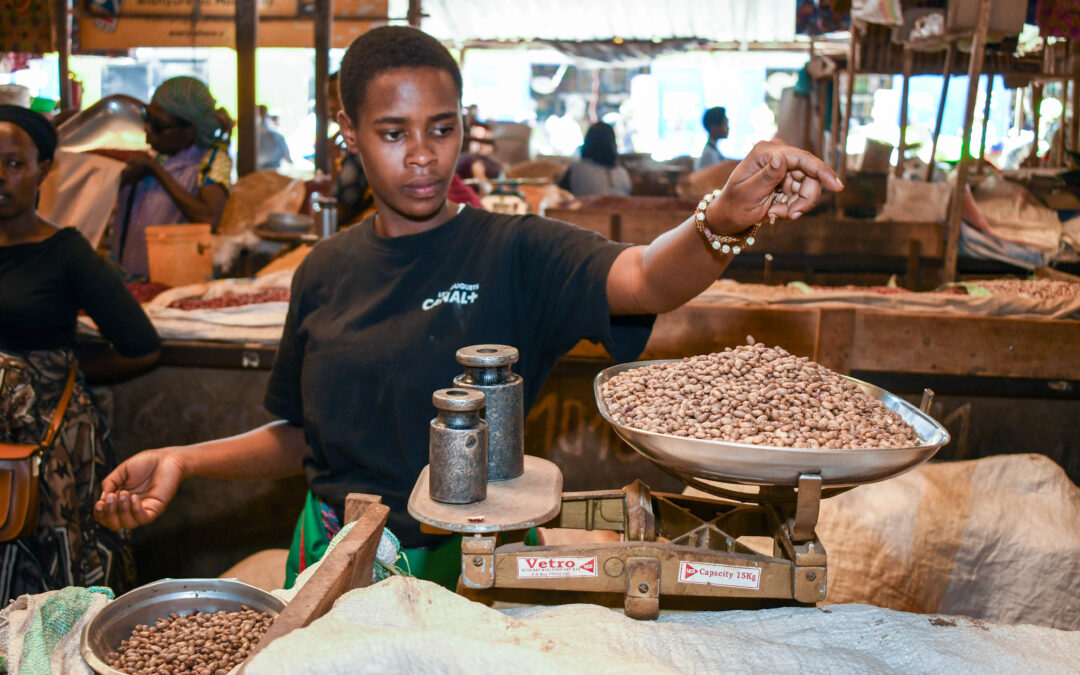By Dennis Ong’or, Eileen Inyanji, Boaz Waswa, Justin Mabeya, and Jean Claude Rubyogo (Alliance of Bioversity International and CIAT)
Emily Mwiti, and Mary Maritim (Cherubet Foods and Company Ltd)
David Karanja (Kenya Agricultural and Livestock Organization (KALRO – Katumani)
Kenya imports up to 30% of the beans it consumes annually from neighboring countries, such as Ethiopia, Tanzania, and Uganda. This reliance on imports results in a loss of potential job opportunities within Kenya’s domestic bean production and value chain. The low adoption of improved bean varieties including biofortified high iron and zinc beans (HIB), low yields, and unstructured bean markets make it difficult for processors to get enough grain for processing. Realizing this challenge, in 2021 the Alliance of Bioversity International and CIAT (Alliance) in collaboration with the Kenya Agricultural and Livestock Research Organization (KALRO), through Pan-Africa Bean Research Alliance (PABRA | The Pan-Africa Bean Research Alliance), formed a consortium led by Cherubet Company Ltd[1], which also included Abosi Top Hill Farmers’ Cooperative Society Ltd[2]. This consortium sought to address this gap through the project “Nutritious Bean Products for Decent Employment for Youth[3] in Kenya (NBP-DEYK),” funded by the Challenge Fund for Youth Employment (CFYE). The focus was on empowering youth by leveraging on the potential of HIB in production, aggregation, sale, processing and consumption of the grain and processed bean products.
Creation and Improvement of Job Opportunities for Women and Youth: Project Goals and Achievements
The initial rationale for this project was to create new job opportunities and enhance existing ones for the youth, particularly young women, across various sectors. The term created jobs refers to those positions offered for the first time as a direct result of the project’s activities. On the other hand, improved jobs refer to existing positions whose working conditions, skills, or professional capacities were enhanced through the project’s capacity-building efforts.
The project’s goals targeted a combined total of at least 500 job opportunities, including 120 jobs to be created and 380 jobs to be improved. By the end of 2024, the project reports showed that Cherubet Foods alone had 110 new jobs (86 female and 24 male) – all youth, representing 92% success rate against the target. Additionally, the project supported the improvement of 500 existing jobs directly linked to Cherubet Foods, which included farmers, motorbike riders, aggregation managers, kiosk operators and hawkers. Out of this figure, 434 jobs were held by youth (279 female and 155 male) and 66 jobs by non-youth as shown in Figure 1.
In addition, jobs improved among farmers particularly with Abosi Top Hill FCS continued to grow. The corporative has attracted new membership of farmers majority of whom have an interest in bean production. As of February 2025, the number of farmers stood at 624 up from 269 by end of 2023. Among them, 468 are women and 156 are men. In terms of age distribution, 321 are youth (243 young women) as shown in Figure 2. This interest can be attributed to business growth associated with production, sale and consumption of the high iron and zinc beans, which has contributed to creation and improvement of jobs, improved livelihoods and resilience especially among women.
Further, disaggregation of jobs created and improved according to age group and gender, showed that, by end of 2024, the project’s impact on youth employment was significant, with 60% of jobs being taken by young women and 29% by young men. Non-youth roles accounted for 11% of all positions, with women occupying 8% of these roles and men 3% as shown in Figure 3.

Fig 2 (left): Abosi Top Hill FCS membership by Feb 2025; and Fig. 3 (right): Overall jobs created and improved by gender and age group by 2024.
Prospects for the Future
Reflecting on the remarkable achievements of the project, which reached 92% success in job creation and exceeded the target by improving over 100% of jobs, we are more committed than ever to the journey ahead. These results are not just milestones—they represent the beginning of a broader movement towards youth empowerment and community development. Building on the foundation of these successes, we envision a future where youth empowerment and inclusive community development are intrinsically linked. By leveraging innovation, technology, and inclusive partnerships, we aim to scale the impact of our initiatives to even greater heights. Our goal is to ensure that every member of society, particularly youth and women, is given the opportunity to thrive through the creation of decent, sustainable jobs that guarantee a prosperous and secure future.
Acknowledgements
We gratefully acknowledge the contributions of the Government of Kenya through the County Government of Bomet and the Kenya Agricultural and Livestock Research Organization (KALRO). A big thank you goes to the consortium partners including Cherubet Foods, the bean farmers in Abosi Top Hill FCS, Kaplomboi Rotu FCS, Crop Soko Ltd and Alliance of Bioversity International and CIAT who continue to collaborate and invest in and upgrade bean value chain. Finally, special thanks go to the Netherlands Ministry of Foreign Affairs for funding the Challenge Fund for Youth Employment (CFYE) Programme managed by the Palladium Group and which supported “the Nutritious Bean Products for Decent Employment for Youth in Kenya (NBP-DEYK) project”.
____________________________________________________________________________________
[1] Cherubet Ltd is a food processor based in Nairobi
[2] Abosi Top hill FCS is a registered farmer organization in Bomet county engaged in production and aggregation of HIB
[3] Youth/young people as used in this article represents individuals in the age bracket of 15-35


